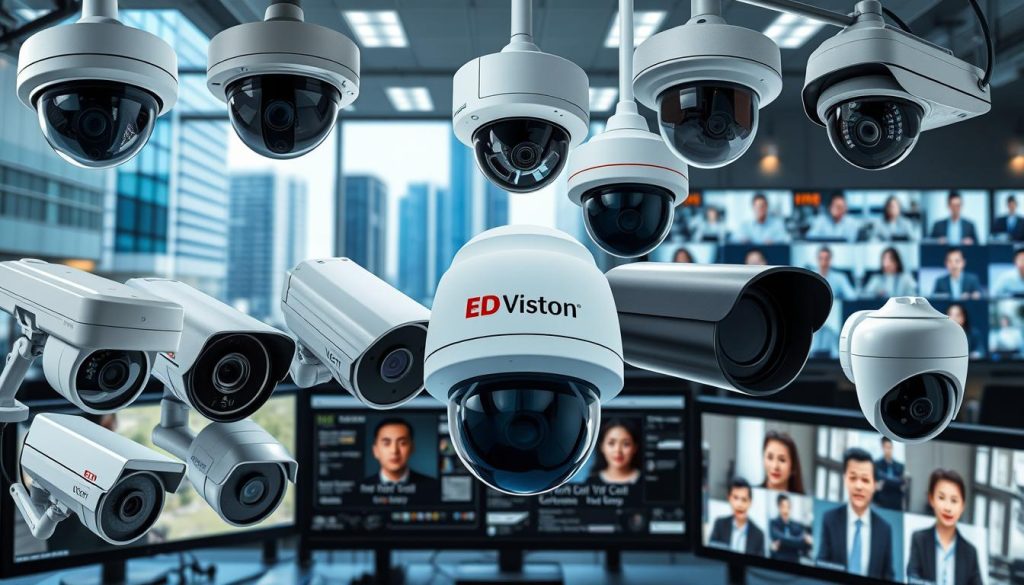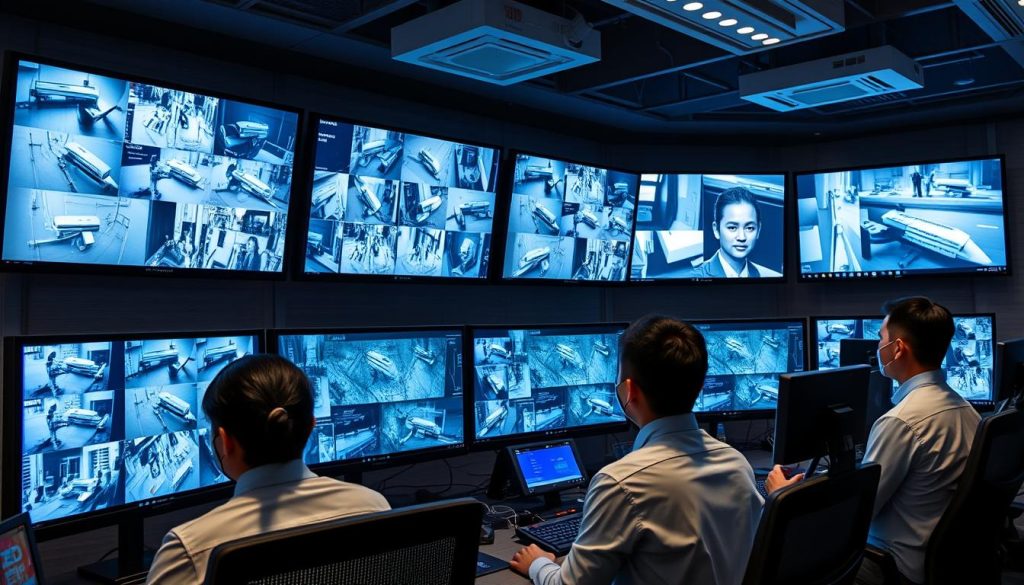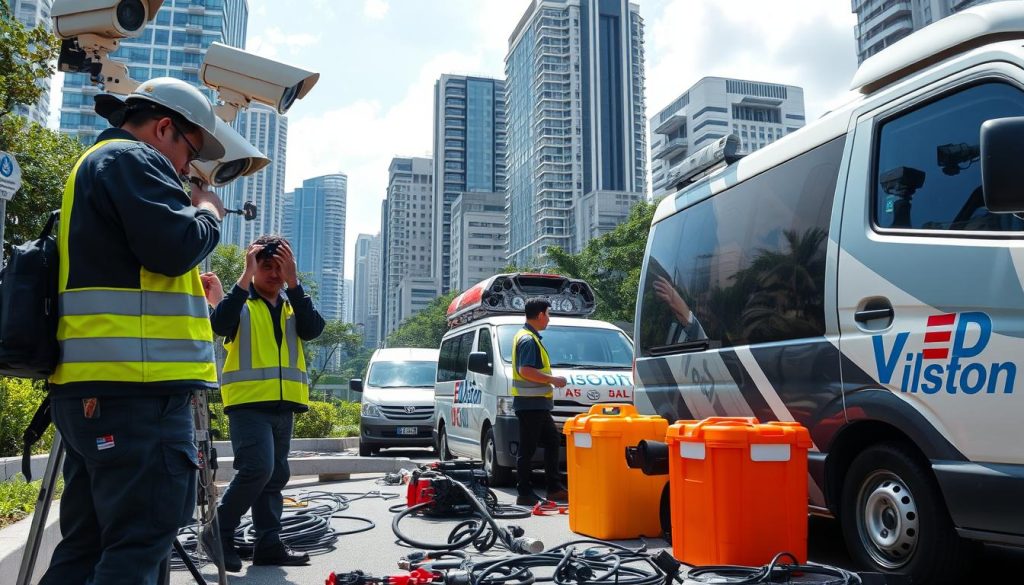Ever thought about how a simple CCTV installation turns into a full security solution? In busy places like Singapore, strong security is key. This article looks into CCTV services, covering key parts like installation, maintenance, monitoring, and upgrades. Knowing what a CCTV service offers helps you protect your space better.
Key Takeaways
- CCTV services include installation, maintenance, monitoring, troubleshooting, and upgrades for top security.
- IP and analog cameras are the main types used in CCTV systems.
- Wired systems with Power over Ethernet (PoE) are best for big areas.
- Knowing the difference between DVRs and NVRs is important for picking the right recording system.
- Regular upkeep and fixing are key for CCTV systems to last and work well.
- For the latest CCTV info and deals, call ED Viston at +65 8313 4578.
What is CCTV?
CCTV, or closed-circuit television, is a key part of today’s safety and security. It’s a video system that sends signals to a few monitors. This tech is different from public TV, as it watches private areas. It started in 1942 with German scientists for rocket monitoring.
Over time, CCTV has changed a lot. Now, it’s a must-have in security solutions.
Definition and Origin of CCTV
The CCTV history began in the military, like during atomic bomb tests. Later, it was used for business and home security. Now, CCTV helps stop crimes and helps solve them.
This change shows how important CCTV is for keeping us safe.
CCTV’s Role in Modern Security
In modern security solutions, CCTV is very important. It has features like motion detection to save space and watch for trouble. You can also watch live footage on phones or computers.
Companies with CCTV can save a lot on security costs. Sometimes, they save over 60% a year. This shows how CCTV meets many security needs.
For custom CCTV services and the newest solutions, call ED Viston today at +65 8313 4578.
CCTV Applications
CCTV technology has many uses across different fields. It boosts security and gives important insights. It’s used in crime management, disaster response, and medical studies. These uses show how CCTV systems help keep us safe and give us peace of mind.
Crime Management and Surveillance
CCTV is key in fighting crime. It stops criminals and helps police find evidence. It watches over public areas, businesses, and homes, making them safer.
Places with CCTV often have less crime. This proves how well it works in keeping communities safe.
Disaster Management and Emergency Services
CCTV is vital in disaster situations. It lets emergency teams watch what’s happening in real time. This helps them make fast decisions, saving lives and managing resources better.
It’s used to watch over natural disasters. This helps teams respond quickly when every second matters.
Medical Monitoring and Research
In healthcare, CCTV helps keep an eye on patients. It lets doctors see if patients need help right away. It also helps in labs by showing what’s happening in experiments.
CCTV systems offer big benefits to many industries. To learn more about CCTV solutions for your needs, call ED Viston at +65 8313 4578. We’ll tell you about our offers.
How Does CCTV Work?
CCTV systems are key in keeping places safe and secure. They work by using important parts and steps to record and check footage.
Basic Components of a CCTV System
A CCTV system has main parts that work together. About 60-70% have cameras and recorders. Analog cameras are used in about 40% of systems.
Digital Video Recorders (DVRs) are used in 70% of setups. Wired systems work well up to 300 meters. Wireless cameras can reach about 20 meters but can be blocked by walls.
Recording and Analyzing Footage
Recording and checking footage uses advanced tech. Hard disks are used in nearly 90% of systems. Modern systems use high-definition monitors for clear video.
Digital systems with IP cameras are popular for their clear images and extra features. These tools help in analyzing footage, making security better.
For the latest CCTV solutions, call ED Viston at +65 8313 4578. They offer great deals tailored to your needs.
Types of CCTV Systems
It’s important to know the different types of CCTV systems to pick the best one. Each type has its own benefits and fits different security needs. You’ll find analog, digital, and network/IP cameras, each with its own strengths and weaknesses.
This section will help you understand the difference between analog and digital systems. It will also explain how network/IP cameras work. This information will help you make a smart choice.
Analog vs. Digital Systems
Analog CCTV is known for being affordable and easy to set up. But, it doesn’t offer the best image quality. On the other hand, digital CCTV systems provide clearer images and more features.
Digital systems also let you access footage from anywhere using smartphones. They can send data over the internet, making them more advanced than analog systems.
Network/IP Camera Systems
Network/IP cameras changed the game by letting you watch live feeds from anywhere. They use the internet, so you don’t need a lot of cables. This makes them great for both inside and outside use.
These cameras have high-definition quality, which is key for clear images. Their flexibility and effectiveness make them a top choice for modern security needs.

| Type of CCTV | Resolution | Use Case | Features |
|---|---|---|---|
| Analog CCTV | Lower Resolution | Small Businesses | Cost-effective, easy installation |
| Digital CCTV | High Resolution | High-risk Areas | Remote access, advanced features |
| Network/IP Cameras | Very High Resolution | Varied Environments | Wireless connectivity, flexible installation |
Choosing the right CCTV system depends on your security needs and budget. Each type has its own benefits for different situations. For expert advice, contact ED Viston today at +65 8313 4578.
Key CCTV Tech Terms
Knowing key CCTV technology terms is essential for anyone in surveillance. Understanding video encoders and image sensors helps you see how systems work. This knowledge helps you choose the right equipment for your needs.
Video Encoders
Video encoders are key in CCTV tech. They turn analog video into digital, making it work with today’s networks. This makes video quality better and easier to store and share online.
With Cat 5/6 cables, fast data transfer is possible. So, using good video encoders is more critical than ever.
Image Sensors Explained
Image sensors are vital for clear CCTV footage. There are CMOS and CCD sensors. CMOS uses less power and is more efficient. CCD sensors can handle more light, but vary in size.
LUX values measure how well cameras work in the dark. Lower LUX values mean better low-light performance. Features like autofocus and AGC also help keep images clear in different light.
| Feature | CMOS | CCD |
|---|---|---|
| Power Consumption | Lower | Higher |
| Size Variability | N/A | 1/4″ to 2/3″ |
| Integration Capability | High | Limited |
| Low-Light Performance | Good | Excellent |
New tech like video analytics and advanced monitoring systems improve CCTV setups. Knowing these terms helps you find the best security solutions.
Want to check out the latest CCTV solutions and deals? Call ED Viston today at +65 8313 4578!
Network CCTV Pros and Cons
Network CCTV systems are becoming more popular in homes and businesses. Knowing the network CCTV advantages and network CCTV disadvantages helps in making the right choice for security. This guide will cover key points about network CCTV and the CCTV risks it may pose.
Advantages of Network CCTV
Network CCTV systems have many benefits over old systems:
- Remote Access: You can watch feeds from anywhere with internet, making it very convenient.
- High-Resolution Images: IP cameras give better image quality, which is important for identifying people.
- Scalability: These systems can grow with your security needs easily.
- Power over Ethernet (PoE): This feature makes installation simpler by using one cable for power and data.
- Cloud Storage: Recordings are kept on cloud servers, keeping data safe from damage or theft.
Disadvantages and Risks
Despite their benefits, network CCTV systems have some downsides:
- Higher Initial Costs: IP cameras cost more than analog systems at first.
- Hacking Risks: If not set up right, cameras can be hacked, leading to unauthorized access.
- Signal Disruption: Wireless systems might have issues that affect video quality and reliability.
- Steeper Learning Curve: Network systems can be harder to use, needing more training or help from experts.
The global IP camera market is growing fast, expected to hit USD 9,809.2 million with an 8.38% growth rate in commercial surveillance. It’s important to weigh the network CCTV advantages and network CCTV disadvantages carefully. In Singapore, 60% of people see CCTV as key to security, making it vital to understand both sides.

If you’re looking to set up a reliable CCTV system, contact ED Viston today at +65 8313 4578. They offer the latest CCTV solutions and deals.
| Aspect | Advantages | Disadvantages |
|---|---|---|
| Installation | Power over Ethernet for simplified setup | Requires professional assistance in some cases |
| Image Quality | High-resolution coverage | Potential quality loss due to signal disruption |
| Access | Remote viewing capabilities | Vulnerable to hacking if not properly secured |
| Storage | Cloud storage for data safety | Cost considerations based on storage capacity |
Analog CCTV Pros and Cons
Analog CCTV systems have key benefits and some drawbacks. Knowing these helps you choose the right monitoring solution.
Benefits of Analog Systems
Analog CCTV is cost-effective and easy to install. It needs a wired connection, making setup simple. Plus, analog cameras work well with other devices, making them flexible for different setups.
- Cost-effective solutions, even for big camera setups
- Easy to set up with simple wiring
- Works well with many existing systems
Limitations of Analog CCTV
Analog CCTV has its downsides, mainly when compared to IP cameras. It offers lower image quality and lacks features like remote access and wireless options. IP cameras are now preferred for their better image quality, digital storage, and advanced analytics.
- Poorer picture quality than digital IP cameras
- No wireless connectivity
- No advanced analytics or monitoring tools
Deciding between analog and IP cameras depends on your needs. Analog is good for basic, cost-effective monitoring. But for advanced security, IP cameras are the better choice.
Need a tailored security solution? Call ED Viston at +65 8313 4578 to learn about the latest CCTV options and deals.
CCTV Maintenance and Support
Keeping a CCTV system in top shape is key. Regular upkeep extends its life and keeps it working well. It involves checking for problems and fixing them before they cost a lot.
Some common tasks include swapping out bad cables and updating software.
Here’s a quick look at important maintenance tasks:
- Weekly: Check the date and time, watch the footage, and make sure cameras are right.
- Monthly: Clean the camera lenses, check cables for damage, and update the software.
- Quarterly: Do a full system check, look at the camera housing, and clean the power supply units.
- Annually: Get a professional to visit, check the camera setup, and make sure everything is in focus.
Using a detailed maintenance checklist is essential. It keeps the system reliable and secure. It’s important to check lens alignment and clean off dust and moisture.
Regular checks help find problems early. This means less downtime and better surveillance.
CCTV support services help fix any issues quickly. Getting a maintenance plan can save money by avoiding big repairs. Experts are ready 24/7 to keep your system running smoothly.
If you want a solid CCTV maintenance plan, call ED Viston today at +65 8313 4578. They’ll share the latest CCTV solutions and tailor them to your needs.
What Does a CCTV Service Include?
A good CCTV service is key for reliable security. It includes the setup, upkeep, and watching of CCTV systems. Knowing these parts helps businesses choose the right security.
Installation Process and Considerations
Setting up a CCTV system takes several steps. First, a site survey finds the best camera spots and wiring paths. Experts make sure the system fits the place’s security needs.
Things like camera types and lighting are important. They affect how well the system works.
Ongoing Maintenance and Troubleshooting
Keeping the system running right is important after it’s set up. It’s best to check it yearly. This includes cleaning cameras, checking wires, and updating software.
These steps keep the system working well and reduce downtime. For big systems, remote checks can fix problems fast, without needing someone to come out.
Monitoring and Alarm Response Services
Watching the CCTV system in real-time boosts security. It lets people react fast to threats. Some services also handle alarms, checking footage and taking action if needed.
This quick response can stop security problems before they start.
If you’re in Singapore looking for CCTV solutions, call ED Viston at +65 8313 4578. They can tell you more about what they offer and how they can meet your needs.
| Service Component | Description | Importance |
|---|---|---|
| CCTV Installation Process | Site survey, equipment selection, and custom installation | Ensures optimal security coverage |
| Ongoing Maintenance | Regular servicing, troubleshooting, and remote diagnostics | Minimizes downtime and enhances system longevity |
| CCTV Monitoring Service | Real-time monitoring and alarm response | Immediate action to prevent security breaches |
CCTV Upgrades and Enhancements
In today’s fast-changing world, keeping up with security threats is key. Upgrading your CCTV system is a smart move. It brings better functionality and new features. This part talks about when you should upgrade and the benefits of doing so.
When to Consider Upgrading Your System
There are a few signs you might need to upgrade your CCTV:
- Image Quality: If your cameras show blurry or grainy images, it’s time for a change. HD or 4K cameras can make a big difference.
- Functionality: Older systems might not have features like precise motion detection or alarm integration. Newer models do.
- Coverage: Check your cameras regularly. You might find spots that aren’t covered, which is important for surveillance.
- Software Updates: Keeping your security camera software up to date is critical. It helps protect against threats and adds new features.
Benefits of Modernizing Your CCTV Setup
Upgrading your CCTV system brings many benefits:
- Improved Precision: New systems have better motion detection. This means fewer false alarms and more accurate alerts.
- Seamless Integration: Modern systems work well with other security tools. This creates a strong and unified safety plan.
- Staff Preparedness: Training on new system features helps staff respond better to incidents. They can use security tech more effectively.
- Maintenance Practices: Regular checks on your cameras can improve their performance and lifespan. Look for lens obstructions or damage.
If you’re thinking about upgrading for better security, call ED Viston at +65 8313 4578. They can guide you on the latest CCTV solutions and offer custom advice. Don’t delay; make your space safer today.
Conclusion
Understanding CCTV services is key for better safety and security at home and work. With over 4 million CCTV cameras in the UK and many theft cases, a good CCTV system is more important than ever. Services like installation and maintenance keep systems working well and give us peace of mind.
Regular checks are also vital. Experts say to check CCTV systems every three months. This keeps them running well and helps watch over areas effectively. By keeping up with maintenance, businesses can protect their things and make a safer place. For more on CCTV options, visit Wenhong’s dedicated page on their services.
If you want to learn more about CCTV technology, contact ED Viston at +65 8313 4578. In summary, CCTV is a must-have for security. It helps us see and control what’s happening around us.
FAQ
What does a CCTV service include?
What is the installation process for CCTV systems?
How often should I perform maintenance on my CCTV system?
What kind of troubleshooting support is available for CCTV systems?
How does CCTV monitoring work?
When should I consider upgrading my CCTV system?
What are the advantages of network/IP camera systems over analog systems?
What types of image sensors are commonly used in CCTV cameras?
How does the recording and analysis of footage work in CCTV systems?
What measures can be taken to secure my network CCTV system against hacking?
Source Links
- https://www.gensecurity.com/blog/understanding-cctv-components-the-4-parts-every-system-requires
- https://www.cctvsecuritypros.com/articles/what-is-cctv-and-how-does-it-work/?srsltid=AfmBOopw2k6auXCzv1LKZd-2Ar4bVl8DOkQouDp3sykKaaCPPawD5VGn
- https://www.paessler.com/it-explained/cctv
- https://www.statesystemsinc.com/blog/what-is-cctv/
- https://www.securitastechnology.com/ie/blog/what-cctv-monitoring-and-how-does-it-work
- https://www.secom.vn/en/column/what-is-cctv/
- https://www.cctvsecuritypros.com/articles/what-is-cctv-and-how-does-it-work/?srsltid=AfmBOorU06422GH8SUiBjI9AMc6eDNba-wJS2myumplMZZio5cCLMDVX
- https://cctvcamera.com.sg/how-cctv-works/
- https://www.cctvsecuritypros.com/articles/what-is-cctv-and-how-does-it-work/?srsltid=AfmBOooXB7IndyjNvs8GqY9g3SPkDmTdJn-8_7_HQDvaxvDtTOTAUfLB
- https://www.smssecurity.com.au/blog/how-does-cctv-work/
- https://www.caughtoncamera.net/news/different-types-of-cctv/
- https://www.avigilon.com/blog/types-of-cctv-cameras
- https://www.pelco.com/blog/types-of-cctv-cameras
- https://www.tridon.com/your-cctv-glossary-key-terms-worth-knowing/
- https://www.a1securitycameras.com/blog/video-surveillance-security-cameras-technical-terms/?srsltid=AfmBOoowdn2sBBR1Ifb5qjzUhp2Hc1G0Xp1h8hul5UbHk44swC0X6pqa
- https://safeguardsystems.co.uk/cctv-monitoring/cctv-monitoring-10-terms-need-to-know/
- https://www.buildingsecurity.com/blog/cctv-vs-ip-cameras/
- https://www.cctvsg.net/advantage-and-disadvantage-of-wireless-cctv/
- https://info.verkada.com/security-cameras/ip-camera/
- https://pro-vigil.com/blog/ip-camera-vs-analog-cctv-camera/
- https://www.securitymagazine.com/articles/88854-pros-and-cons-for-ip-vs-analog-video-surveillance
- https://www.cctv-camera.com.sg/articles/cctv-maintenance-checklist.html
- https://bas-ip.com/articles/cctv-maintenance/
- https://cctvmaintenance.com.sg/cctv-services/cctv-maintenance-and-services/
- https://clearview-communications.com/security/cctv/cctv-maintenance/
- https://cobrafireandsecurity.co.uk/cctv-maintenance/
- https://pacifictd.com/maintaining-and-upgrading-your-business-security-camera-system/
- https://the-security-net.co.uk/cctv-systems-maintenance-service/
- https://lodgeservice.com/the-top-9-benefits-of-cctv-security-protecting-people-and-property/
- https://allroundsecurity.co.nz/blog/does-my-cctv-camera-system-need-maintenance/
- https://www.firstsolution.com.sg/blog/how-to-conduct-cctv-camera-maintenance/

